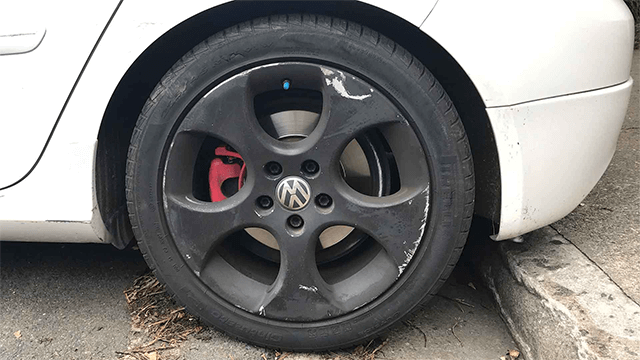Alloy wheel cleaning tips
Matilda Douglas-Henry
Alloy wheels are a stylish and practical addition to any vehicle. They enhance your driving performance, as well as the overall look and feel of your car. Maintaining your alloys is important not just for aesthetics, but to ensure that each wheel is functioning well. If you regularly clean, polish and wax your alloy wheels, you are guaranteeing their longevity and can have them looking brand-new. Here are some tips for cleaning your alloy wheels, including:
- Materials you will need
- How to clean alloy wheels
- How to clay and polish alloy wheels
- How to wax and dress alloy wheels
- Alternative home products
- Products and practices to avoid

Materials you will need to clean your alloy wheels
- Specialist alloy wheel cleaner;
- Pressure washer or hose;
- All-purpose cleaner;
- Soft-bristle wheel brush;
- Clay lubricant;
- Metal polish;
- Alloy wheel wax and/or tyre dressing.
How to clean your alloy wheels
You might think that you can clean your alloy wheels with the same cleaner you use for the rest of your car. This will get the job done to an extent, but will only get rid of surface-level dirt and grime. The most important thing to remember when cleaning your alloy wheels is that you need to be thorough and methodical to get rid of all the debris that has been firmly baked in, so a specialist alloy wheel cleaner is a must.
Step one of the cleaning process is to do a pre-wash with a pressure washer (or hose) to wash away the excess dirt, mud and grime from the brake pads and alloys. If necessary apply some general car wash cleaner to the rims, using the wheel brush to remove any more dirt*.
Next, put on some gloves and spray each wheel with the alloy cleaner, and loosen the grime and brake dust with the wheel brush. Remember to really get in there amongst the spokes; this will ensure that the wheel is being properly cleaned on either side. While the wheels are still wet, clean the lug nuts.
Use an all-purpose cleaner on the wheel wells, which are likely to have gathered dirt and debris. Then, rinse the entire wheel thoroughly before drying it with a chamois cloth. It’s always a good idea to use a new cloth each time you clean your wheels so that you’re not passing dirt and particles back and forth.
Claying and polishing
If you want to do a pretty basic job of cleaning your alloy wheels, you need only pay attention to the section above, but it’s advisable to continue the process to have your alloys looking as good as new. A generous spray of clay lubricant on your wheel will remove any lingering dirt or residue. Detailing clay can also be rubbed over the wheels and spokes which will allow you to get into the more inaccessible areas.
Polishing is an important step that will allow your alloys to shine once more. The metal polish you need to use is contingent on the surface metal of your alloys, so make sure you have that identified before buying any product. Wipe metal polish onto each wheel and spread it manually; or, if you have one, a polishing powerball is a nifty tool that can get into the toughest nooks and crannies. Wipe the wheel clean once the polish has started to dry or fade.
Waxing and dressing
Adding a wheel wax to your alloys will protect them from brake dust and other debris to an even greater extent, and also adds an extra layer of shine*. Apply protectant and then buff each wheel. Doing this every three months is an easy way to have your alloys protected and looking spic and span*. You can also use tyre dressing: another protectant which adds greater depth to the glossy finish of your good-as-new alloys.
Are there any generic home products that I can use to clean my alloy wheels?
There certainly are. It’s always recommended to use specific cleaning products for your alloy wheels, but if you find yourself in an urgent bind for whatever reason there are some surprising home remedies that do the trick.
White vinegar or cider on a microfibre cloth, for example, can remove stubborn grease. A solid spray of oven cleaner, followed by a scrub and wash with a hose, can eliminate brake dust. Baking soda and baby oil can help in keeping rust away from your alloys. And we can’t forget WD-40, an ever-reliable solution for tar removal.
What not to do when cleaning alloy wheels
- Never use abrasive products or steel wool on your alloys. These will compromise the metal and have an impact on the longevity of the wheels.
- Don’t wash your wheels until they have completely cooled down. When the heat evaporates the water it can leave soap spots. You also risk warping your brake pads.
- Don’t steam clean your wheels*.
Conclusion
Like all vehicle maintenance, being proactive with cleaning your alloy wheels will only benefit you and your car in the long-term. We hope this article has been helpful in offering some tips; if you are in need of more than a good clean, remember to use DingGo’s quick quotes service for your alloy wheel repair needs.
